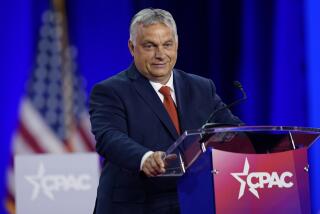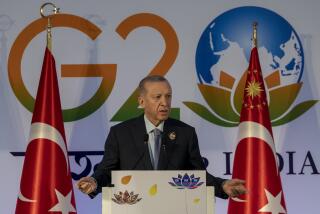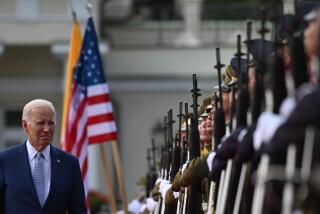Still Courting Turkey, Bush Meets With a Top Politician
- Share via
WASHINGTON — Intensifying his campaign to win Turkey’s military support for a possible war on Iraq, President Bush on Tuesday received the leader of Turkey’s new ruling party at the White House and declared he is committed to gaining the NATO ally’s entry into the European Union.
Before a meeting with Recep Tayyip Erdogan, chairman of the Justice and Development Party, Bush told reporters that he stands “side by side” with Turkey as it seeks membership in the European Union.
“My administration is working hard on Turkey’s behalf,” he said.
Bush and aides declined to say whether Erdogan had agreed in private talks to U.S. requests to allow American troops and planes to use Turkey as a staging area for an invasion of northern Iraq.
Turkish officials have said they will provide military assistance if the United Nations finds that Iraq has not complied with orders to disarm. But, with strong resistance among the Turkish public to a new war, Turkish officials have not committed to providing the help that U.S. officials believe would be essential to carrying out the U.S. war plan.
White House Press Secretary Ari Fleischer called Tuesday’s meeting “positive” and said the leaders had discussed “ways we can cooperate.” But he declined to provide details.
The joint appearance was a calculated effort to pressure European Union officials, who are expected to decide at a Copenhagen summit Thursday and Friday whether to set a date for negotiations on Turkey’s application to join the union.
Some EU members have been resisting American pressure. At a meeting in Brussels, a majority of EU foreign ministers cast their support behind a German-French plan that would permit talks to begin in 2005 if Turkey passed a human rights review in 2004. Turkey has rejected this plan, arguing, with U.S. support, that talks should start next year.
Although the foreign ministers could still be overruled in Copenhagen by the European heads of state, their views suggested broad support for the proposal by Europe’s two biggest countries.
Erdogan signaled that he wants as much U.S. help as he can get. He welcomed Bush’s support and said he hopes the president will make more calls to European leaders on his country’s behalf.
“We are aware of your support on this matter and are very appreciative of it. But it shouldn’t end here. We expect it will continue,” Erdogan said.
Erdogan’s party has Islamist roots, but he and other officials have been trying to convince U.S. and European officials that they intend to remain firmly within Turkey’s secular tradition.
Turkey has been pushing for entry into the European Union for years. Advocates contend that by integrating a Muslim nation of 66 million into the West, Europe would build a bridge to the Islamic world and offer a model of democratic and free market values to the rest of the Middle East.
But some European nations, already struggling with the cost of integrating the poorer nations of Eastern Europe, contend that Turkey is still too poor and too undemocratic to be smoothly absorbed.
One key to the EU’s decision on accession talks is whether Turkey is willing to use its influence to help settle the long-running dispute between Greeks and Turks on the island of Cyprus. United Nations officials are now pushing a peace plan to settle the dispute that could pave the way for Cyprus to join the EU.
Two Americans who spoke to Erdogan during his trip said they believed he was not yet ready to commit to giving the United States all the military assistance it has requested.
These Americans, who asked to remain unidentified, noted that Erdogan’s party is only now getting organized after winning elections Nov. 3.
They pointed to the strong public opposition in Turkey to a war, noting that a recent Pew Research poll showed that 83% of Turks opposed allowing the U.S. to use their country’s military bases to strike Iraq.
Bulent Aliriza, a specialist on Turkey at the Center for Strategic and International Studies in Washington, said he did not believe that the United States and Turkey intended to strike a deal on military assistance during this visit.
“This trip was to set the stage for a guy who’s going to be there for a long time,” he said, noting that Erdogan could become the Turkish prime minister in several months.
He said it was good for U.S. public relations in the Islamic world for Bush to appear with the leader of a party with Islamist roots.
At the same time, Aliriza acknowledged that there are risks involved with U.S. efforts to pressure the Europeans.
“There is a danger that it could backfire,” he said.
More to Read
Get the L.A. Times Politics newsletter
Deeply reported insights into legislation, politics and policy from Sacramento, Washington and beyond. In your inbox twice per week.
You may occasionally receive promotional content from the Los Angeles Times.











